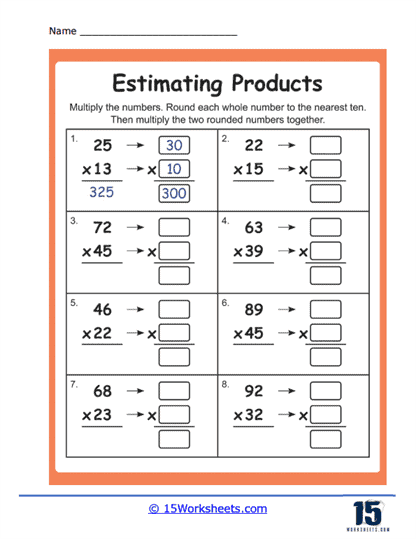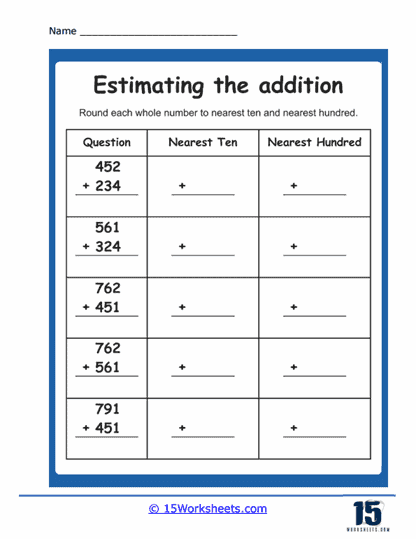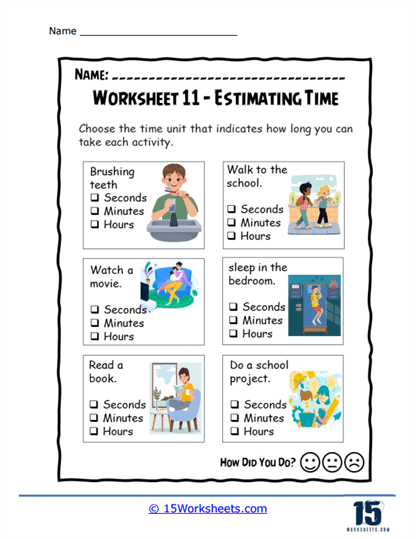Estimation Worksheets
About These 15 Worksheets
In today’s fast-paced world, the ability to manage time efficiently and make quick, reasonable approximations is becoming increasingly essential, both in academic settings and professional environments. A series of thoughtfully designed worksheets offers a powerful tool to help students hone these critical skills-specifically, their ability to approximate time intervals and durations with accuracy and confidence. More than just exercises, these worksheets serve as a gateway to developing lifelong competencies that reach far beyond the classroom.
Time management is a skill that touches every aspect of life, from organizing personal schedules to handling large-scale projects in professional careers. For students, learning how to estimate time intervals teaches them to prioritize tasks, meet deadlines, and work more efficiently under pressure. This is a skill that evolves and strengthens through practice, and the worksheets in question are designed precisely for this purpose. They guide students through various scenarios where they must gauge how long a task might take, assess the duration of an activity, or decide how best to allocate their time. By practicing these approximations, students gradually build a natural sense of timing, which ultimately enhances their productivity.
But these worksheets extend far beyond simply helping students keep track of time. They also play a pivotal role in refining their numerical approximation skills, which are fundamental to both academic success and real-world problem-solving. The ability to make educated guesses-whether estimating a number, a value, or a time frame-is a critical element in mathematical reasoning. In the real world, precise calculations are not always feasible or necessary. In many instances, especially when faced with limited information or time, a quick and reasonable approximation is not only sufficient but highly valuable.
Estimation allows individuals to make rapid decisions, whether they are calculating how much food to buy for a party or gauging the feasibility of a budget for a project. Through repeated exposure to estimation challenges, students learn to assess quantities and values swiftly and confidently, a skill that is transferable across countless life scenarios. The estimation worksheets empower students by giving them the tools to approach problems methodically yet flexibly, which fosters a deeper understanding of mathematics and its practical applications.
The act of estimation is central to the process of learning mathematics itself. It serves as a preliminary step that enables students to gauge the reasonableness of their answers before engaging in complex, time-consuming calculations. This habit of estimating first helps students avoid careless mistakes and ensures that their final answers make sense in context. When students are confident in their ability to approximate, they approach problems with a clearer sense of direction and purpose, which in turn improves their overall problem-solving abilities.
Estimation also nurtures critical thinking, encouraging students to analyze a problem from multiple angles. For instance, when faced with a complex math problem, students who are skilled in estimation can break it down into smaller, more manageable parts. They can assess each part individually, estimate the outcomes, and then piece together a more accurate final answer. This process not only boosts their mathematical proficiency but also trains them to think logically and strategically, skills that are essential for success in any discipline.
What makes these estimation worksheets even more impactful is their relevance to real-world challenges. Whether it’s making informed financial decisions, such as estimating the cost of groceries or planning a household budget, or evaluating the time and resources needed to complete a project, estimation is everywhere. By practicing approximation skills early on, students gain the confidence to tackle real-world problems with a practical mindset. This prepares them not just for academic achievements but for the diverse and unpredictable challenges of adult life.
Estimation skills are highly sought after in the professional world, where efficiency and decision-making are paramount. In fields ranging from engineering to finance, professionals are often required to make quick assessments and approximations before committing to detailed analyses. A project manager, for example, might need to provide an initial estimate of the time or cost required to complete a task before gathering precise data. In such cases, the ability to make a well-reasoned guess can save valuable time and resources. By practicing these skills in school, students are preparing themselves for the demands of future careers, where their ability to estimate effectively can make a significant difference in productivity and success.
Here is a look at all the different sub-categories of worksheets that we have available:
Students will develop skills in estimating values and making reasonable guesses, which is essential in solving problems where exact answers are unnecessary or hard to obtain. These skills are useful in everyday life for tasks like budgeting, measuring, or comparing quantities, enhancing both efficiency and confidence in decision-making.
Students will learn how to make educated guesses about quantities by visually assessing groups of objects, enhancing their ability to estimate in situations where counting each item is impractical. This skill is valuable in everyday scenarios like shopping, organizing, or determining amounts quickly and efficiently without needing precise counts.
These worksheets play a crucial role in helping students develop a solid foundation in decimal number sense. Students will learn to round or approximate decimal numbers to a specified place value or a certain number of decimal places.
These worksheets serve as a valuable tool to help students develop the ability to make informed approximations and assess the reasonableness of their answers when performing subtraction operations.
These skills are essential for a wide range of mathematical and real-world applications, including measurements, recipes, budgeting, and problem-solving.
These worksheets help students develop essential skills for dealing with financial transactions and managing money in their daily lives. These skills are critical for responsible financial decision-making, budgeting, shopping, and understanding the value of money.
A collection of worksheets that can help students practice and develop their skills in estimating the results of multiplication operations. These skills are not only useful in everyday life but also in more advanced mathematical topics as students advance in their studies.
A series of worksheets that are designed to help students practice and develop their skills in estimating the results of division operations. They require students to make reasonable approximations of the quotient (the result of division) of two numbers, often before performing the actual division calculation.
The types of tasks available on these sheets help students learn to develop their skills in estimating the results of addition operations. Common strategies include rounding numbers to the nearest ten, hundred, or other place value, using compatible numbers, or breaking down numbers into more manageable parts.
These help students practice predicting how long various tasks or activities will take, improving their time management skills. These worksheets are useful in daily life as they teach students to plan effectively, allocate their time wisely, and meet deadlines.
When Do You Use These Skills?
Life is full of everyday moments where we use estimation, often without even realizing it. For children, this skill is woven into their daily routines, shaping the way they think, plan, and navigate their world. Whether they are trying to figure out how long it will take to get ready in the morning or deciding how much money to save for a new toy, children engage in practical, real-world problem-solving through estimation. Let’s explore how these skills are applied across various facets of their lives, highlighting how valuable they are in shaping both independence and confidence.
Time Management
Time is an essential aspect of our lives, and learning to manage it effectively starts early in childhood. Children, though they may not always have a watch on hand, become intuitive timekeepers. As they juggle school, play, meals, and other activities, they naturally estimate how long each task will take. For instance, a child may predict how much time they need to brush their teeth, get dressed, and pack their school bag before catching the bus. Or, they might try to figure out how long they can watch TV before they have to start their homework. These small decisions, made through estimating time, teach them how to allocate their day and manage their responsibilities.
This ability to manage time not only fosters a sense of discipline but also gives children a greater sense of control over their lives. They learn to prioritize, choosing what matters most and developing a deeper understanding of how time affects their daily activities. As they grow older, this skill will be crucial in balancing schoolwork, extracurricular activities, and social lives. Time estimation becomes a foundation for setting realistic goals and meeting deadlines, empowering them to become more organized and self-reliant.
Mealtime
Another place where estimation plays a pivotal role is at the dining table. During mealtimes, children are constantly engaging with numbers, even if they don’t realize it. Whether they are pouring cereal into a bowl or spooning mashed potatoes onto their plate, they use estimation to decide how much food they think they need. Not only does this help prevent food waste, but it also teaches them the importance of portion control-a valuable lesson for health and nutrition.
Beyond serving themselves, estimation skills come into play when cooking or helping in the kitchen. For example, a child might estimate how long to microwave their meal or how soon boiled eggs will be ready. They learn that some foods take longer to prepare than others and that timing is crucial in cooking. These moments foster a sense of independence as children begin to take more responsibility for their meals and develop a practical understanding of how much time, effort, and resources go into food preparation.
Distance and Travel
As children begin to explore their neighborhoods or walk to nearby locations, estimation becomes a key tool in understanding distance and travel time. Walking to a friend’s house or estimating when the school bus will arrive requires a mental calculation of how long the journey will take. Children begin to grasp spatial awareness as they estimate how far they can ride their bike before they need to turn around or how long it will take to walk back home before dark.
These early lessons in distance estimation have broader implications as they grow. They develop a mental map of their environment, honing their sense of direction and their ability to navigate from place to place. Estimating travel time teaches them to plan ahead, whether for a trip to the park or the walk to school. It also helps foster a sense of responsibility, as they learn to manage their time effectively to ensure they arrive on time and stay safe.
Money and Spending
Estimation is particularly powerful when it comes to understanding money. As children receive pocket money or allowances, they start to estimate how much things cost and whether they have enough money to purchase what they want. This process of estimating costs, especially when standing in a toy store or deciding on snacks at a convenience shop, teaches them essential financial skills. They start to grasp the concept of budgeting, learning that sometimes they need to save up for a bigger purchase rather than spending all their money at once.
These small moments of financial estimation help children develop a more mature relationship with money. They learn the value of delayed gratification, the importance of making choices, and how to prioritize their spending. Over time, this skill becomes invaluable as they begin managing larger sums of money, making financial decisions that have a more significant impact on their lives.
Art and Crafts
Creativity flourishes in the world of arts and crafts, and estimation plays a surprisingly significant role here as well. When children cut paper, measure lengths of string, or pour out just the right amount of paint for a project, they are relying on their estimation skills. These activities not only boost their creativity but also help refine their precision and attention to detail.
Art and craft projects often require children to think ahead and plan their resources, teaching them how to manage limited supplies effectively. For example, they might estimate how much glue they need for a craft without using too much, or how many pieces of fabric are needed to complete a design. Estimation fosters a resourceful mindset, encouraging children to make the most of what they have while still achieving their creative vision.
Homework and Studying
As children grow older, estimation becomes an important tool in managing their academic workload. When faced with homework or studying for a test, children often estimate how long each task will take. This ability to predict the time needed to finish a reading assignment or solve math problems helps them structure their study time more effectively.
By estimating the time required for schoolwork, children learn how to break larger tasks into smaller, manageable pieces. This skill is vital in developing strong time management habits and avoiding procrastination. Additionally, estimating how many problems need solving or how many chapters must be read can help children stay on track and avoid feeling overwhelmed by their workload.
Technology Usage
In today’s world, children are surrounded by technology, from tablets and laptops to gaming consoles. Estimation skills come into play when they need to decide whether their device has enough battery life to last through a gaming session or if it’s time to charge it. Estimating battery life teaches them the consequences of running out of power at critical moments, which is a small but meaningful lesson in planning ahead.
Whether it’s finishing homework on a tablet or watching their favorite show on a streaming platform, children quickly learn that managing technology is a balancing act. By estimating usage and battery life, they take the first steps in becoming more responsible with their devices, learning to balance fun with responsibility.
Temperature and Weather
Even when it comes to dressing for the day, children use estimation. By looking outside or checking the weather, they estimate how cold or warm it might be and choose their outfits accordingly. These daily estimations help children develop a deeper understanding of seasonal changes and how temperature affects their choices.
Estimation also empowers children to think critically about their surroundings. When they begin to understand how temperature correlates with their comfort, they make more informed decisions about what to wear, which ultimately fosters independence. This small act of self-sufficiency grows with them, preparing them for more complex decision-making as they age.
Health and Hygiene
Daily routines such as brushing teeth, washing hands, and showering require estimation, too. Children might estimate how much toothpaste or shampoo to use, or how long they should brush their teeth to get them properly clean. These small estimations contribute to their overall hygiene, teaching them how to take care of their bodies in a practical and efficient way.
Estimation within health and hygiene also fosters a sense of personal responsibility. As children grow older, they begin to take more control over their hygiene routines, making decisions that affect their well-being. These early habits lay the groundwork for a healthy lifestyle and a greater awareness of how to maintain it.










